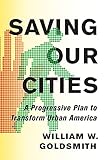Saving Our Cities : A Progressive Plan to Transform Urban America / William W. Goldsmith.
Material type: TextPublisher: Ithaca, NY : Cornell University Press, [2016]Copyright date: ©2016Description: 1 online resource (304 p.) : 11 charts, 1 tableContent type:
TextPublisher: Ithaca, NY : Cornell University Press, [2016]Copyright date: ©2016Description: 1 online resource (304 p.) : 11 charts, 1 tableContent type: - 9781501706035
- 307.760973 23
- HT167 .G665 2017
- online - DeGruyter
| Item type | Current library | Call number | URL | Status | Notes | Barcode | |
|---|---|---|---|---|---|---|---|
 eBook
eBook
|
Biblioteca "Angelicum" Pont. Univ. S.Tommaso d'Aquino Nuvola online | online - DeGruyter (Browse shelf(Opens below)) | Online access | Not for loan (Accesso limitato) | Accesso per gli utenti autorizzati / Access for authorized users | (dgr)9781501706035 |
Frontmatter -- Contents -- Acknowledgments -- Looking Upstream -- 1. Cities as Political Targets -- 2. Cities as Budget-Cutting Targets -- 3. Troubled City Schools -- 4. Options for City Schools -- 5. The Paradox of Plenty -- 6. Drugs, Prisons, and Neighborhoods -- 7. Drug-War Politics -- Democracy, Inequality, Urban Policy -- Notes -- References -- Index
restricted access online access with authorization star
http://purl.org/coar/access_right/c_16ec
In Saving Our Cities, William W. Goldsmith shows how cities can be places of opportunity rather than places with problems. With strongly revived cities and suburbs, working as places that serve all their residents, metropolitan areas will thrive, thus making the national economy more productive, the environment better protected, the citizenry better educated, and the society more reflective, sensitive, and humane. Goldsmith argues that America has been in the habit of abusing its cities and their poorest suburbs, which are always the first to be blamed for society’s ills and the last to be helped. As federal and state budgets, regulations, and programs line up with the interests of giant corporations and privileged citizens, they impose austerity on cities, shortchange public schools, make it hard to get nutritious food, and inflict the drug war on unlucky neighborhoods. Frustration with inequality is spreading. Parents and teachers call persistently for improvements in public schooling, and education experiments abound. Nutrition indicators have begun to improve, as rising health costs and epidemic obesity have led to widespread attention to food. The futility of the drug war and the high costs of unwarranted, unprecedented prison growth have become clear. Goldsmith documents a positive development: progressive politicians in many cities and some states are proposing far-reaching improvements, supported by advocacy groups that form powerful voting blocs, ensuring that Congress takes notice. When more cities forcefully demand enlightened federal and state action on these four interrelated problems—inequality, schools, food, and the drug war—positive movement will occur in traditional urban planning as well, so as to meet the needs of most residents for improved housing, better transportation, and enhanced public spaces.
Mode of access: Internet via World Wide Web.
In English.
Description based on online resource; title from PDF title page (publisher's Web site, viewed 26. Apr 2024)


